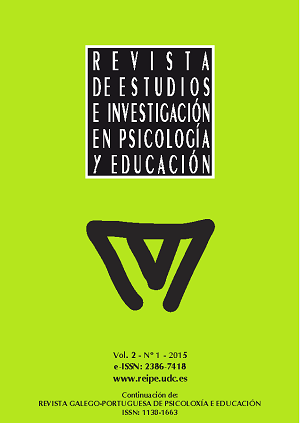Desengajamentos morais, autoeficácia e bullying: a trama da convivência || Moral disengagement, self-efficacy and bullying: the framework of coexistence studies
Contido principal do artigo
DOI:
https://doi.org/10.17979/reipe.2015.2.1.714Resumo
Neste artigo, discute-se a relação entre bullying e desengajamentos morais. Numa investigação com 2600 adolescentes de 14 a 16 anos, buscou-se verificar seu envolvimento em situações de bullying, suas crenças de autoeficácia quanto ao desempenho acadêmico e os possíveis desengajamentos morais demonstrados por eles. Encontrou-se uma correspondência entre ser agressor de bullying e a “desumanização da vítima”. A participação no bullying como autores, vítimas e espectadores também se associou a “culpabilização da vítima” demonstrando o perfil de alvos de bullying frágeis e com pouco valor. Encontrou-se também uma correspondência entre “bom ou muito bom” aluno e menor desengajamento moral, ao comparar-se as crenças de autoeficácia acadêmica e desengajamentos morais. Os resultados deste estudo possibilitaram a compreensão dos mecanismos psicológicos presentes no bullying, a fim de que a escola possa repensar as intervenções e prevenções que realiza para que a convivência seja um valor.
Palavras-chave:
Downloads
Detalles do artigo
Referências
Almeida, A., Correia, I., & Marinho, S. (2010). Moral disengagement, normative beliefs of peer group, and attitudes regarding roles in bullying. Journal of School Violence, 9(1), 23-36. http://dx.doi.org/10.1080/15388220903185639
Avilés, J. M. (2012). Prevención del maltrato entre iguales a través de la educación moral. IIPSI Revista de Investigaciones Psicológicas, 15(1), 17-31.
Bandura, A. (1999). Moral disengagement in the perpetration of inhumanities. Personality and Social Psychology Review, 3(3), 193-209. http://dx.doi.org/10.1207/s15327957pspr0303_3
Bandura, A. (2002). Selective moral disengagement in the exercise of moral agency. Journal of Moral Education, 31(2), 101-119. http://dx.doi.org/10.1080/0305724022014322
Barchia, K., & Bussey, K. (2011). Individual and collective social cognitive influences on peer aggression: Exploring the contribution of aggression efficacy, moral dis-engagement, and collective efficacy. Aggressive Behavior, 37, 107-120. http://dx.doi.org/10.1002/ab.20375
Caravita, C. S., Gini, G., & Pozzoni, T. (2012). Main and moderated effects of moral cognition and status on bullying and defending. Aggressive Behavior, 38(6), 456-468. http://dx.doi.org/10.1002/ab.21447
Hymel, S., Rocke-Henderson, N., & Bonnano, R. A. (2005). Moral disengagement: A framework for understanding bullying among adolescents. Journal of Social Sciences, Special Issue (8), 1-11. http://citeseerx.ist.psu.edu/viewdoc/download?doi=10.1.1.555.2526&rep=rep1&type=pdf
Keltikangas-Jarvinen, L., & Pakasiahti, L. (1999). Development of social problem solving strategies andchanges in aggressive behavior: A 7-year follow-up from childhood to late adolescence. Aggressive Behavior, 25(4), 269-279. http://dx.doi.org/10.1002/ (SICI)1098-2337(1999)25:4<269::AID-AB3>3.0.CO;2-K
Menesini, E., Sanchez, V., Fonzi, A., Ortega, R., Costabile, A., & Lo Feudo, G. (2003). Moral emotions and bullying: A cross-national comparison of differences between bullies, victims and outsiders. Aggressive Behavior, 29(6), 515-530. http://dx.doi.org/10.1002/ab.10060
Olweus, D. (1978). Aggression in the school: Bullies and whipping boys. Washington, DC: Wiley.
Sagone, E., & Licata, L. (2009). The relationship among interpersonal adjustment, moral disengagement, bullying, and prosocial behavior: A study in junior high school. Giornale di Psicologia, 3(3), 247-254.
Sánchez, V., Ortega, R., Menesini, E. (2012). La competencia emocional de agresores y víctimas de bullying. Anales de Psicología, 28(1), 71-82. http://revistas.um.es/analesps/article/view/140542
Slee, P. T. (1993). Bullying a preliminary investigation of its nature and effects of social cognition. Early Child Development and Care, 87(1), 47-57. http://dx.doi.org/10.1080/0300443930870105
Thomberg, R., & Jungert, T. (2013). Bystander behavior in bullying situations: Basic moral sensitivity, moral disengagement and defender self-efficacy. Journal of Adolescence, 36(3), 475-483. http://dx.doi.org/10.1016/j.adolescence.2013.02.003
Tognetta, L. R. P., & Rosário, P. (2013). Bullying: dimensões psicológicas no desenvolvimento moral. Estudos em Avaliação Educacional, 24(56), 106-137. http://dx.doi.org/10.18222/eae245620132736
Turiel, E. (1983). The development of social knowledge: Morality and convention. Cambridge: Cambridge University Press


